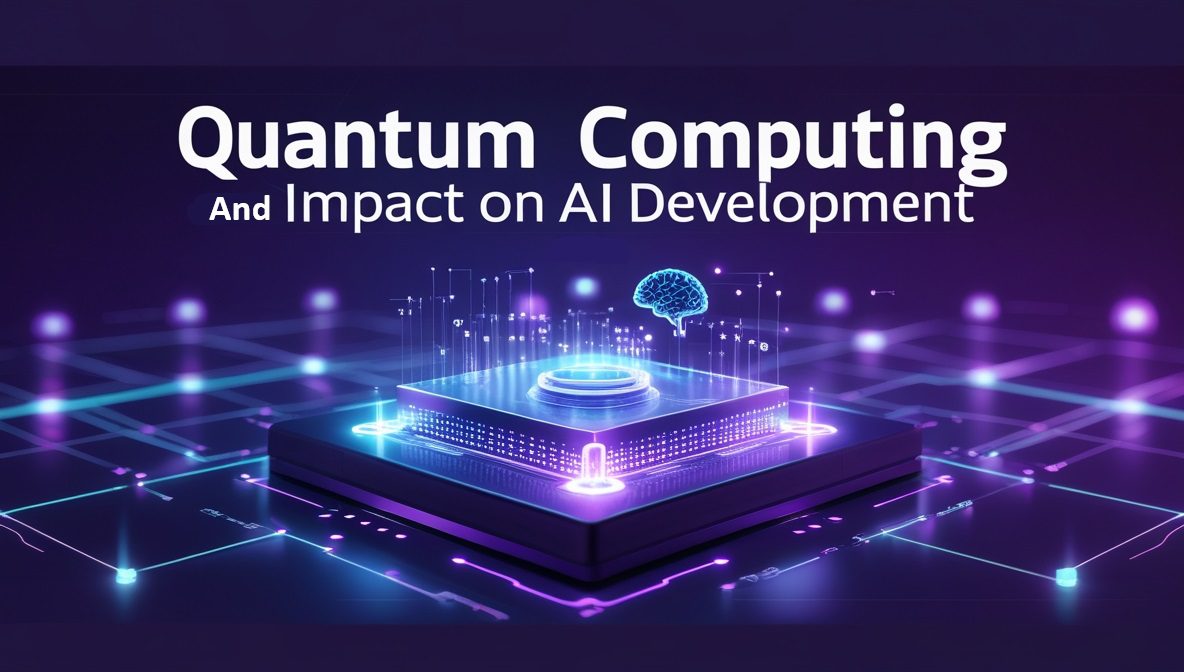Quantum computing is set to revolutionize artificial intelligence (AI) development, unlocking new capabilities that were previously impossible with classical computing. By 2030, quantum computing will significantly enhance AI’s ability to process complex data, optimize machine learning models, and solve problems at an unprecedented scale. The combination of these two advanced technologies will reshape industries, drive new innovations, and accelerate AI’s role in solving global challenges. In This Article We Are Going to Get now About the Quantum Computing and Impact on AI Development by 2030.
The Role of Quantum Computing in AI Development

From the Topic Quantum Computing and Impact on AI Development, The Quantum computing is transforming AI development by exponentially increasing computational power, enabling AI systems to solve complex problems beyond the reach of classical computers. Unlike traditional processors that process information in binary (0s and 1s), quantum computers leverage qubits, which can exist in multiple states simultaneously.
This allows AI algorithms to process vast amounts of data faster, optimize machine learning models more efficiently, and solve intricate challenges in areas like natural language processing, pattern recognition, and generative AI. As quantum technology advances, AI will reach new heights in problem-solving, automation, and predictive analytics.
Quantum Speed and Processing Power
Quantum computers operate on quantum bits or qubits, which allow for massive parallel processing. Unlike classical bits that exist in either a 0 or 1 state, qubits can exist in multiple states simultaneously, exponentially increasing computing power.
By leveraging quantum computing’s immense speed, AI systems will be able to process vast amounts of data much faster. This breakthrough will benefit deep learning models, which rely on large-scale computations, ultimately leading to more efficient neural networks and improved AI-driven solutions.
Complex Problem Solving
Traditional AI struggles with optimization problems that require significant computational power. Quantum computing, through quantum annealing and superposition, can solve highly complex optimization issues faster than classical computers.
For instance, AI-driven logistics planning, drug discovery, and financial modeling will become more precise and efficient with quantum-assisted algorithms. These advancements will allow businesses and researchers to solve problems in minutes that would otherwise take years using classical computing methods.
Enhanced AI Model Training
One of the biggest challenges in AI development is training models efficiently. Current AI models require vast computational resources and time for training, which can limit innovation and application. With quantum computing, AI models will be trained in significantly shorter time frames, allowing for real-time updates and iterative improvements. This will enhance AI’s ability to adapt and learn from new data, improving its predictive capabilities and making AI systems more accurate and responsive.
Quantum AI Applications Across Industries

From Quantum Computing and Impact on AI Development, The fusion of quantum computing and AI is set to revolutionize multiple industries by unlocking new efficiencies and capabilities. In healthcare, quantum-powered AI can accelerate drug discovery by simulating molecular interactions at an unprecedented scale. The finance sector will benefit from highly accurate risk analysis and fraud detection models powered by quantum-enhanced AI.
In logistics, quantum AI will optimize supply chain routes and resource management with unmatched precision. Additionally, industries like cybersecurity, climate science, and materials research will leverage quantum computing to analyze massive datasets, predict trends, and develop advanced solutions previously considered impractical.
Healthcare and Drug Discovery
Quantum-powered AI will revolutionize the healthcare industry by improving medical research, diagnostics, and treatment personalization. Quantum computers can analyze genetic data at an unprecedented scale, allowing AI models to identify patterns in diseases and accelerate drug discovery. This will lead to the development of targeted therapies and personalized medicine, improving patient outcomes and revolutionizing healthcare delivery.
Financial Services and Risk Analysis
The financial sector relies heavily on AI for risk assessment, fraud detection, and algorithmic trading. Quantum computing will significantly enhance these applications. AI-driven predictive models will benefit from quantum computing’s ability to analyze massive financial datasets in real time. This will improve fraud detection accuracy, optimize trading strategies, and enhance decision-making for investment firms and financial institutions.
Cybersecurity and Data Encryption
With AI’s growing role in cybersecurity, quantum computing will play a critical part in strengthening data encryption and threat detection. Quantum cryptography will introduce unbreakable encryption methods, making data security more robust against cyber threats. AI-driven security systems will also leverage quantum computing to detect vulnerabilities in real time, ensuring stronger protection for businesses and governments against cyberattacks.
Challenges and Future of Quantum AI

Regarding to the Topic Quantum Computing and Impact on AI Development, Despite its vast potential, quantum AI faces several challenges before it can achieve mainstream adoption. The technology is still in its early stages, with hardware limitations, error rates, and the need for ultra-cold environments to maintain qubit stability posing significant hurdles. Additionally, developing quantum algorithms that can efficiently integrate with AI models remains a complex task.
However, ongoing research and investment in quantum technology are driving rapid progress, and by 2030, breakthroughs in quantum error correction, scalability, and hybrid quantum-classical systems will make quantum AI more accessible and practical. As these challenges are overcome, quantum AI will play a transformative role in shaping the future of technology and innovation.
Hardware and Technological Limitations
Quantum computers require highly specialized environments to function, such as extremely low temperatures and precise calibration. The development of scalable and cost-effective quantum hardware is crucial for making this technology accessible to a broader audience. Efforts are being made to improve quantum hardware, including advancements in superconducting qubits and quantum error correction techniques. By 2030, breakthroughs in quantum chip design and stability will accelerate its adoption in AI applications.
Quantum Algorithm Development
AI developers will need to adapt their algorithms to work effectively with quantum computing architectures. Existing machine learning models are built for classical computing, and new quantum algorithms must be developed to maximize the potential of quantum AI. Research in quantum machine learning is ongoing, and as more quantum algorithms are developed, AI applications will become more efficient and capable. Collaboration between quantum physicists and AI researchers will be essential in driving these advancements.
Ethical and Security Concerns
The power of quantum AI raises ethical concerns, especially regarding data privacy and security. With quantum computing’s ability to break current encryption methods, new security frameworks must be established to protect sensitive information. Governments and organizations must work together to create policies and regulations that ensure ethical AI development while leveraging quantum computing responsibly. This will be critical in maintaining trust and transparency in AI-driven systems.
Conclusion
The Quantum Computing and Impact on AI Development by 2030 will mark a new era in technological advancements, enabling AI to process information at an unprecedented scale and efficiency. From revolutionizing healthcare and finance to enhancing cybersecurity, the impact of quantum AI will be felt across every industry. While challenges remain in hardware development, algorithm optimization, and security concerns, the future of quantum AI is promising, paving the way for smarter, faster, and more powerful AI-driven solutions.

